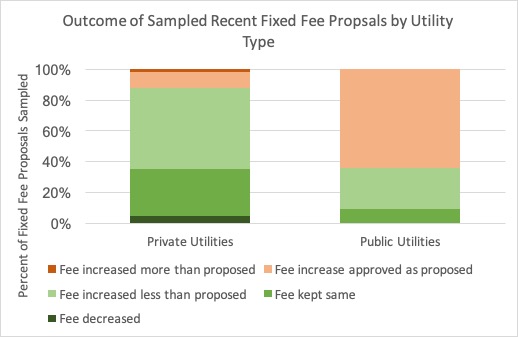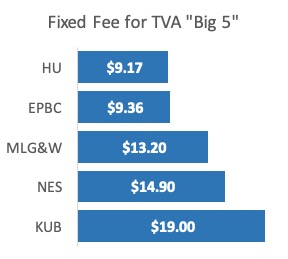The Knoxville Utilities Board (KUB) appears to have set electric rates on feelings rather than economics for years, keeping customers in the dark about how rates align with costs, and has no apparent plans to change. This blog provides a technical look at KUB’s rate-setting methods (or lack thereof) in relation to recent increases in the mandatory monthly fee.
How KUB Sets Rates
Utilities like KUB operate as monopolies. Since the price of KUB electricity is not competitive, KUB and other monopoly utilities traditionally set rates based on the cost to provide electricity. There are two basic steps: allocation between customer types (residential, commercial, and industrial) and, second, setting the type of rates (monthly fees and rates based on use of electricity).
Most regulators require monopoly utilities to perform what’s known as a “cost of service study” to determine the correct cost allocation between customer types and among the different parts of the rates. There are a few methods for cost of service studies, and particularly for determining how to split costs between monthly fees and usage rates, the most common being a Basic Customer Method (explained below). The cost of service study is presented to a regulator and usually includes a transparent process for approving the study and rates.
Many utilities have been trying to increase mandatory fees in recent years as they have seen electricity usage flatten and at times decline. TVA utilities fall into that category, and it is burdening many customers.

However, outside of TVA, most regulated utilities have not been successful in increasing mandatory fees. Our calculations show that only about one-fifth of utility proposals to increase mandatory fees are implemented at the utility’s proposed level. Most are increased less than half of the utility’s proposal or not increased at all (approximately 60% of all utilities). Interestingly, public utilities that may fall outside the state-wide rate regulatory process are more likely to have their fixed fee proposals implemented at the utility’s desired level (64%) than private utilities (11%).
It is our understanding that KUB’s Board of Directors has unanimously approved every proposed mandatory fee increase in at least the past decade.
Basic Customer Method vs Minimum System Method
The Basic Customer Method states that only costs that can be traced back to a customer are charged to that customer in a mandatory fee, and the rest of the customer bill is based on usage. By “rest of the customer bill,” the Basic Customer Method includes all of the utility’s costs to maintain its distribution system in rates that are based on electricity usage, those costs are not included in the mandatory monthly fee. The distribution system includes the lines and transformers you see on poles along your street and substations used to connect to the transmission system.
The alternative method KUB has chosen to use to study costs is the Minimum System Method. This method includes some part of the distribution system costs in the mandatory monthly fee: customers pay for the distribution of electricity even before they turn the lights on.
By “minimum system,” the utility’s consultants create an imaginary distribution system that is sized to deliver a minimal amount of electricity to the number of utility customers. KUB’s cost of service study includes an imaginary, minimum size distribution system that costs nearly half (48%) as much as the actual distribution system. KUB’s residential mandatory fee thus includes not only the Basic Customer Method costs, but also nearly half the cost of the distribution system.
So when you are driving anywhere in Knoxville, and see some power lines, remember that every month, you are billed for nearly half the cost of those power lines!
If KUB were to use the Basic Customer Method, based on its 2018 cost of service study, the mandatory fee for residential customers should be $5.47 per month. Instead, using the minimum system method, KUB currently charges $19 and plans to increase the charge to $20.50 in November. That difference adds up.
History of KUB’s Mandatory Fee Hikes
Up to this point, this blog has been a bit misleading. While KUB endorses the minimum system method, most of its mandatory fee increases occurred before it did a study to determine what the fee should be!
KUB first completed a cost of service study in 2018. Since 2010, this fee has more than tripled, from $6.09 to $19! KUB implemented at least seven mandatory fee increases before the 2018 study was completed.
Not only was the KUB Board adopting fee increases without any review of actual costs for 8 years, but KUB may also continue to raise mandatory fees without any additional cost studies. KUB will be developing a new rate proposal this year for Board approval early next year. After meeting with KUB executives, we learned that KUB will not be using the cost of service study to inform any upcoming rate changes, and in fact, it was only done as a “check” on their rates after they were already set.
I and many KUB customers are alarmed at the failure of the KUB Board to insist on standard utility practices in setting fees and rates. These fees and rates should be based on utility costs, and the information should be shared with customers in a transparent method.
However, KUB has provided zero documentation that their decade of fixed fee increases were based on costs. Maybe KUB has been increasing fees based on feelings and not economics? KUB says rates are based on costs, but we have no way to confirm. KUB, show us the receipts!
How KUB Tries to Justify Its Excessive Mandatory Fees
If KUB isn’t using economics to justify its high fees, what are its best arguments?
Some high fee advocates liken a large mandatory fixed fee to the fees charged by a cell phone service plan. They say that many customers are fine with paying a high monthly fee rather than paying based on how many texts are sent or the length calls made.
However, there are two very important ways your electric bill differs from your cell phone bill. First, you have a choice in who provides your cell phone service. If your cell phone company increases their fees you can go to another provider. For electricity, there is no such choice.
Second, while some cell phone charges include “unlimited” service, many people choose plans with lower monthly fees that do include limits on data, texts, and call minutes. Cell phone customers have lots of options that electric customers lack.
Likening KUB’s monopoly, one-size-fits-all fees and rates to cell phone service plans may make sense to high-earners who assume everyone uses “unlimited” service plans, but that’s not the real world. Many people limit their cell phone, as well as electricity, usage in order to keep to a tight family budget.
How Does KUB Compare?
KUB staff might also point to other utilities with high mandatory monthly fees. This is also wrong for two reasons. First of all, most utilities with fees over $20 per month were able to set those without any transparent public review of the decision. As mentioned above, regulators across the country are rejecting or trimming fee increases where approval is required.

Second, when looking at KUB’s peers in the Tennessee Valley, it is evident that KUB’s mandatory fee is excessive. KUB has the largest mandatory fee of all of TVA’s “Big 5” – the 5 largest municipal electricity providers in TVA. This is the best comparison of KUB to “like” utilities.
Most utilities that deliver power from TVA are smaller and more rural than KUB. Low population, rural utilities have different kinds and levels of costs than urban systems. Comparing KUB’s cost of service to that of a small, rural utility is not comparing apples to apples.
Take Action
If you are a KUB customer and are also outraged about KUB’s lazy, negligent rate-making, join the movement to #RenewTN!